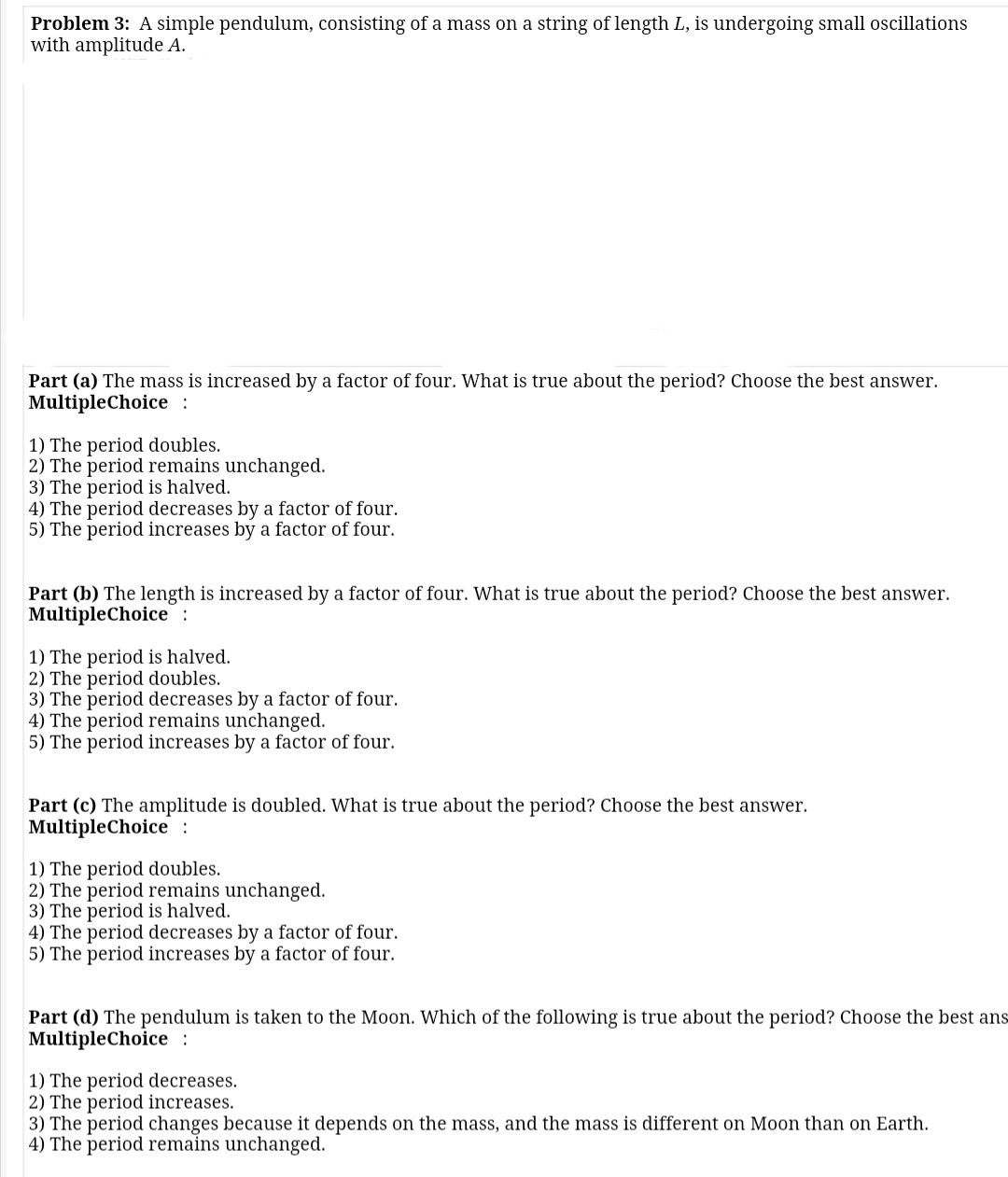Problem 3: A simple pendulum, consisting of a mass on a string of length L, is undergoing small oscillations with amplitude A. Part (a) The mass is increased by a factor of four. What is true about the period? Choose the best answer. MultipleChoice: 1) The period doubles. 2) The period remains unchanged. 3) The period is halved. 4) The period decreases by a factor of four. 5) The period increases by a factor of four. Part (b) The length is increased by a factor of four. What is true about the period? Choose the best answer. MultipleChoice: 1) The period is halved. 2) The period doubles. 3) The period decreases by a factor of four. 4) The period remains unchanged. 5) The period increases by a factor of four.
Problem 3: A simple pendulum, consisting of a mass on a string of length L, is undergoing small oscillations with amplitude A. Part (a) The mass is increased by a factor of four. What is true about the period? Choose the best answer. MultipleChoice: 1) The period doubles. 2) The period remains unchanged. 3) The period is halved. 4) The period decreases by a factor of four. 5) The period increases by a factor of four. Part (b) The length is increased by a factor of four. What is true about the period? Choose the best answer. MultipleChoice: 1) The period is halved. 2) The period doubles. 3) The period decreases by a factor of four. 4) The period remains unchanged. 5) The period increases by a factor of four.
Principles of Physics: A Calculus-Based Text
5th Edition
ISBN:9781133104261
Author:Raymond A. Serway, John W. Jewett
Publisher:Raymond A. Serway, John W. Jewett
Chapter12: Oscillatory Motion
Section: Chapter Questions
Problem 9P
Related questions
Question
can you please solve (a) & (b)?

Transcribed Image Text:Problem 3: A simple pendulum, consisting of a mass on a string of length L, is undergoing small oscillations
with amplitude A.
Part (a) The mass is increased by a factor of four. What is true about the period? Choose the best answer.
MultipleChoice :
1) The period doubles.
2) The period remains unchanged.
3) The period is halved.
4) The period decreases by a factor of four.
5) The period increases by a factor of four.
Part (b) The length is increased by a factor of four. What is true about the period? Choose the best answer.
MultipleChoice :
1) The period is halved.
2) The period doubles.
3) The period decreases by a factor of four.
4) The period remains unchanged.
5) The period increases by a factor of four.
Part (c) The amplitude is doubled. What is true about the period? Ch0oose the best answer.
MultipleChoice :
1) The period doubles.
2) The period remains unchanged.
3) The period is halved.
4) The period decreases by a factor of four.
5) The period increases by a factor of four.
Part (d) The pendulum is taken to the Moon. Which of the following is true about the period? Choose the best ans
MultipleChoice :
1) The period decreases.
2) The period increases.
3) The period changes because it depends on the mass, and the mass is different on Moon than on Earth.
4) The period remains unchanged.
Expert Solution
This question has been solved!
Explore an expertly crafted, step-by-step solution for a thorough understanding of key concepts.
This is a popular solution!
Trending now
This is a popular solution!
Step by step
Solved in 3 steps with 2 images

Knowledge Booster
Learn more about
Need a deep-dive on the concept behind this application? Look no further. Learn more about this topic, physics and related others by exploring similar questions and additional content below.Recommended textbooks for you

Principles of Physics: A Calculus-Based Text
Physics
ISBN:
9781133104261
Author:
Raymond A. Serway, John W. Jewett
Publisher:
Cengage Learning

Physics for Scientists and Engineers, Technology …
Physics
ISBN:
9781305116399
Author:
Raymond A. Serway, John W. Jewett
Publisher:
Cengage Learning

Classical Dynamics of Particles and Systems
Physics
ISBN:
9780534408961
Author:
Stephen T. Thornton, Jerry B. Marion
Publisher:
Cengage Learning

Principles of Physics: A Calculus-Based Text
Physics
ISBN:
9781133104261
Author:
Raymond A. Serway, John W. Jewett
Publisher:
Cengage Learning

Physics for Scientists and Engineers, Technology …
Physics
ISBN:
9781305116399
Author:
Raymond A. Serway, John W. Jewett
Publisher:
Cengage Learning

Classical Dynamics of Particles and Systems
Physics
ISBN:
9780534408961
Author:
Stephen T. Thornton, Jerry B. Marion
Publisher:
Cengage Learning

Physics for Scientists and Engineers: Foundations…
Physics
ISBN:
9781133939146
Author:
Katz, Debora M.
Publisher:
Cengage Learning

College Physics
Physics
ISBN:
9781285737027
Author:
Raymond A. Serway, Chris Vuille
Publisher:
Cengage Learning

College Physics
Physics
ISBN:
9781305952300
Author:
Raymond A. Serway, Chris Vuille
Publisher:
Cengage Learning